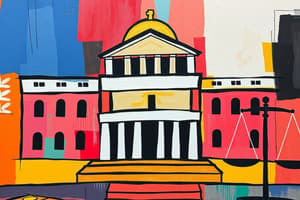Podcast
Questions and Answers
What is the nature of the Minister's discretion regarding Acts of Parliament?
What is the nature of the Minister's discretion regarding Acts of Parliament?
- The Minister is the final interpreter of the Act.
- The Minister can override any Act of Parliament.
- The Minister must adhere strictly to the parameters of the Act. (correct)
- The Minister's discretion is limited only by public opinion.
Which of the following is NOT a main ground for Judicial Review?
Which of the following is NOT a main ground for Judicial Review?
- Irrationality
- Ineffectiveness (correct)
- Illegality
- Procedural unfairness
In the Article 50 case (Miller I), which court first heard the case?
In the Article 50 case (Miller I), which court first heard the case?
- UK Supreme Court
- Court of Appeal
- District Court
- High Court (correct)
What outcome can result from a successful Judicial Review?
What outcome can result from a successful Judicial Review?
What does the principle of proportionality refer to in the context of judicial review?
What does the principle of proportionality refer to in the context of judicial review?
Which aspect of the judicial system does 'Royal Prerogative' relate to?
Which aspect of the judicial system does 'Royal Prerogative' relate to?
What is judicial activism primarily concerned with?
What is judicial activism primarily concerned with?
What does the term 'Irrationality' signify in judicial review?
What does the term 'Irrationality' signify in judicial review?
What is the primary purpose of the principle of overriding objective in the court system?
What is the primary purpose of the principle of overriding objective in the court system?
Which aspect of a judicial decision is referred to as 'ratio decidendi'?
Which aspect of a judicial decision is referred to as 'ratio decidendi'?
Which courts are capable of creating binding precedents according to the hierarchy of courts?
Which courts are capable of creating binding precedents according to the hierarchy of courts?
In the context of precedent, which situation allows the Court of Appeal to deviate from its own previous decisions?
In the context of precedent, which situation allows the Court of Appeal to deviate from its own previous decisions?
What is a key limitation of obiter dicta in legal rulings?
What is a key limitation of obiter dicta in legal rulings?
What is the significance of the doctrine of stare decisis within the legal system?
What is the significance of the doctrine of stare decisis within the legal system?
Which of the following best describes the function of accurate law reports?
Which of the following best describes the function of accurate law reports?
Which type of reports existed during the period of 1272-1535 in the context of law reporting?
Which type of reports existed during the period of 1272-1535 in the context of law reporting?
What is the primary difference in the burden of proof between criminal law and civil law?
What is the primary difference in the burden of proof between criminal law and civil law?
Which document, signed in 1215, significantly influenced constitutional law?
Which document, signed in 1215, significantly influenced constitutional law?
What does the separation of powers aim to achieve within a government?
What does the separation of powers aim to achieve within a government?
How does common law primarily differ from civil law systems?
How does common law primarily differ from civil law systems?
Which act does NOT protect civil liberties for Scottish citizens?
Which act does NOT protect civil liberties for Scottish citizens?
What is an essential characteristic of the adversarial legal system?
What is an essential characteristic of the adversarial legal system?
Which act clarified the line of succession to the throne?
Which act clarified the line of succession to the throne?
In the context of law-making, who primarily contributes to the common law system?
In the context of law-making, who primarily contributes to the common law system?
Flashcards
Ratio Decidendi
Ratio Decidendi
The legal reasoning behind a judge's decision, which forms the binding precedent.
Obiter Dicta
Obiter Dicta
Additional comments made by a judge which are not binding precedents.
Stare Decisis
Stare Decisis
The legal principle meaning "let the decision stand."
Binding Precedent
Binding Precedent
Signup and view all the flashcards
Original Precedent
Original Precedent
Signup and view all the flashcards
Hierarchy of Courts
Hierarchy of Courts
Signup and view all the flashcards
Court of Appeal
Court of Appeal
Signup and view all the flashcards
Overriding Objective
Overriding Objective
Signup and view all the flashcards
Judicial Activism
Judicial Activism
Signup and view all the flashcards
Lord Denning's Doctrine
Lord Denning's Doctrine
Signup and view all the flashcards
Judicial Review
Judicial Review
Signup and view all the flashcards
Grounds for Judicial Review
Grounds for Judicial Review
Signup and view all the flashcards
Illegality (JR)
Illegality (JR)
Signup and view all the flashcards
Procedural Unfairness (JR)
Procedural Unfairness (JR)
Signup and view all the flashcards
Parliamentary Sovereignty
Parliamentary Sovereignty
Signup and view all the flashcards
Royal Prerogative
Royal Prerogative
Signup and view all the flashcards
Burden of Proof in Criminal Law
Burden of Proof in Criminal Law
Signup and view all the flashcards
Burden of Proof in Civil Law
Burden of Proof in Civil Law
Signup and view all the flashcards
Civil Law System
Civil Law System
Signup and view all the flashcards
Common Law System
Common Law System
Signup and view all the flashcards
Magna Carta
Magna Carta
Signup and view all the flashcards
Separation of Powers
Separation of Powers
Signup and view all the flashcards
Fusion of Powers
Fusion of Powers
Signup and view all the flashcards
Habeas Corpus Act
Habeas Corpus Act
Signup and view all the flashcards
Study Notes
Key Vocabulary and Terminology
- Common Law: A legal system based on precedent, not codified. It's used in countries like the UK, USA, and others.
- Civil Law: A legal system based on codified laws and principles. It's used in countries like those in the European continent.
- Binding Precedent: Decisions in previous cases must be considered when making decisions in similar cases.
- Prerogative Powers: Powers traditionally held by the monarch, now mostly exercised by the government.
- Statutes/Legislation: Laws made by parliament.
- Common law: Describes the current application and evolution of law through court cases, more specifically through judge-made precedents.
Introduction
- Midterm (Oct 7th) and final (Nov 25th) exams are scheduled.
- Various countries, including the UK, US, Caribbean, Kenya, and Mozambique, operate under a common law system.
Common Law vs. Civil Law
- Who makes the law? In common law, legal precedent through court cases typically are developed by judges, while in continental systems it is often based on academics/scholars and universities.
- Primary purpose: For common law systems, the objective is more focused on particular problem-solving that's brought forth in presented cases. In codified systems, the objective is to build/establish laws through systems rather than reactive cases presented to the courts.
- Characteristics: Common law systems are flexible and evolving, whereas civil law systems are more static and built on pre-defined principles.
Constitutional Principles
- Parliamentary Sovereignty: The legislature (parliament/national assembly) has the highest authority.
- Separation of Powers: Division of power between the executive (government), legislative (parliament), and judicial (courts).
- Fusion of Powers: Overlaps in power between different branches, especially in executive branches.
Private Law
- Contract Law: Deals with contracts, non-disclosure agreements (NDAs), and receipts.
- Tort Law: Situations where a party is harmed by another's wrongful conduct and is entitled to a legal remedy.
- Property Law: Includes ownership, possessions and other tangible goods.
- Trusts Law: Legal structures for managing assets belonging to others.
- Family Law: Covers relationships, family-related issues.
Public Law
- Civil Law: The system that a particular country uses and specifically in relation to private law.
- Criminal Law: The standard of proof is higher for more severe crimes.
The Role of Parliament
- House of Commons: 650 elected members every 5 years.
- House of Lords: Members are appointed, usually based on past service or political positions.
Constitutional Reform Act 2005
- Established the Supreme Court as the highest court in the UK.
- Reformed the role of the Lord Chancellor..
Prerogative Powers
- Traditionally held by the monarch, these powers are exercised by the government (especially the Prime Minister). Examples include conducting foreign affairs, negotiating treaties, going to war, and making public appointments.
Studying That Suits You
Use AI to generate personalized quizzes and flashcards to suit your learning preferences.




